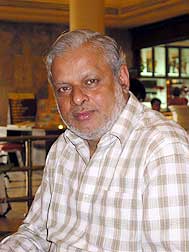|
|
|
Ranabir Samaddar: Stop seeing peace as a soft, intangible moral issue. For peace _ like war _ is tough politics. |
If
you want the southern conflict to ease and peace to
last, Professor Ranabir Samaddar has some useful
advice.
His name may not ring a bell here and he
might not have any up-to-date details about the deep
South, but his life-time experiences as a peace activist
in conflict-ridden South Asia have made him an expert on
the anatomy of war and peace, which he hopes can help
shorten the painful peace-building processes
elsewhere.
Samaddar, 54, was in town recently to
give a "Peace Audit" talk at Thammasat University. His
first piece of advice: Stop seeing peace as a soft,
intangible moral issue. For peace _ like war _ is tough
politics.
Though on a different end of the
continuum, peace _ like war _ can be quantified,
measured and monitored so one can detect warning signs
if peace is slipping towards violence.
His second
piece of advice: Don't let the government and rebel
leaders hijack the peace process.
"You must take
your agency back," said the 54-year-old founder and
director of the Calcutta Research Group, a team of
scholar-activists engaged in peace policies and
dialogues.
Samaddar is known for his critical
studies of contemporary issues of justice: human rights,
popular democracy, trans-border migration, community
history and technological restructuring in South
Asia.
He has served on various commissions and
study groups on issues such as partitions, forced
displacement, minority rights and forms of
autonomy.
When conflicts explode, he said, the
silent majority tends to let the government and rebel
elites monopolise the political dealings which are
mostly conducted secretly, far from public view and void
of informed public consent.
Governments tend to
ignore injustice _ rebel movements, meanwhile, are often
plagued by infighting between moderates and extremists,
leading to distrust and violence that leads to, at best,
a precarious peace.
Trust and truth are
prerequisites for peace. But for it to be sustained, it
must be plural, just and faithful to human rights, he
said.
"To make peace last, it must begin with a
vision of peace from below," stressed
Samaddar.
While truces and treaties have proven
to repeatedly fail, his experiences in several "hot"
places in South Asia have shown that there is still hope
if ordinary people at different levels define what peace
means to them, then together design peace indicators and
help one another monitor and audit them.
But what
are the indicators for peace? A lack of bloodshed? The
standard of justice and human rights? Equitable income?
Fair management of natural resources?
It is all
up to the people involved, he said. The important thing
is to ensure that the dialogue involves activists from
different levels of society, for they each have
different ideas of what peace means.
Don't expect
conflicts to disappear, he cautioned, but the
multi-level dialogue and peace auditing will enable
things to be workable.
"Peace is not
conflict-free," he pointed out. "The dialogue is in
effect a contested conversation. But conflicts will play
out in different ways in the peace
process."
Peace managers, he said, must pay
attention to history, the multiple levels of auditing
and the multiple issues of auditing.
Conventional
wisdom that the past should be forgotten so one can
start anew should be debunked, he advised.
Peace
is not possible if we do not have knowledge of what has
created the conflicts and what landmark events have led
to the explosion of violence, he
explained.
History is an important political tool
used by both dominant and minority groups, who each
interpret historical events differently and from their
own points of view.
Dominant groups, however,
often impose their views through state mechanisms to
create public consensus that dismiss the grievances of
the minority.
Peace is not sustainable if these
grievances are not recognised, he said. It is then
mandatory for society to collectively confront
state-constructed history to understand how conflicts
evolve so they can re-define their agendas
together.
This process of reclaiming the truth
will give moral credibility to the dialogue which will
help make peace last, he added.
It is also
important to recognise that peace is a plural question.
"The activists involved are plural, so are the issues,"
he said.
And among the very important issues are
conflicts on the ground. "We must look at these issues
so we can identify the activists [to join the peace
dialogues and auditing].
"The key is peace from
below," he stressed. This public peace process, he
explained, will enable people from various sectors to
listen to one another and understand that the issues
involved are many and complex.
More importantly,
it fosters communication and new alliances that can help
prevent things from slipping into dangerous
zones.
He calls it the politics of
friendship.
When their voices are loud and strong
enough to become a critical group, the government can no
longer dismiss them, he said.
But how to help
small people overcome their fears of voicing their
grievances and of defining their own peace? And who will
be the effective peace managers?
One's proven
record of integrity and moral courage is essential to
foster trust and patience among diverse groups, he
said.
Since ordinary people are also often mired
in fear, peace managers must prove their sincerity and
commitment overtime through all sorts of actions and
activities to convince them to join the public peace
process.
"It's an ongoing process, not a one-time
thing," he cautioned. "And it's important not to impose
your own politics on the locals."
Local activism
aside, urban intellectuals can play an important role in
fostering a more open atmosphere for peace by
deconstructing the historical myths or deceptions that
underline ethnic conflicts.
His last words of
advice: Don't see the other side as your enemy. Keep the
communication channels open. And be very, very
patient.
